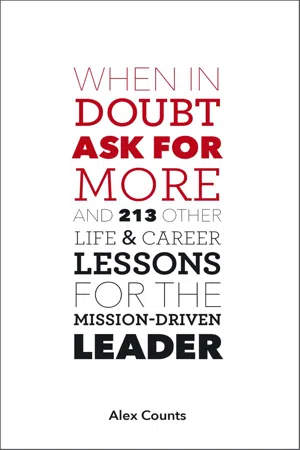![]() The Lessons
The Lessons![]()
Accepting Applause
ONE ELEMENT OF PUBLIC GRACE is the ability to be comfortable while accepting a compliment. A parallel skill is the ability to accept, and indeed to enjoy, the applause of an audience. When you finish delivering a speech, be sure to stay on stage and maintain eye contact with the audience while they applaud for you. This applies especially if the event has been arranged wholly or partially in your honor, or if the audience accords you a standing ovation. Avoid the mistake of hurrying off stage, which deprives the audience of the satisfaction of knowing you are accepting and savoring their appreciation.
![]()
Advance Travel Connections, Making
HAVING TO TRAVEL A LOT is one of the most stressful and difficult aspects of many professional careers. Make something positive out of this potential negative by periodically looking a few weeks ahead in your calendar. Think about acquaintances, friends, and family who live in the places you’ll be visiting in the next month or two. Then consider contacting them in advance to set up a time to get together. Remember, people with complicated lives (like yours) often can’t make last-minute plans. So call or email them with an invitation. If they can make the time to see you, you’ll enjoy a few moments of fun and friendship while you travel. And even if they can’t, your relationship will have been renewed and strengthened.
![]()
Advice Is (Often) Unnecessary
WHEN A COLLEAGUE, associate, or friend chooses to talk with you about some important and deeply personal issue they are wrestling with, don’t assume they want your advice. They probably don’t. Instead, your most valuable contribution is likely to be hearing them out, letting them know you understand their situation and feelings, and affirming your belief that they’ll ultimately make the right decision about how to handle it. Offering those three simple gifts can often do more to ensure a happy outcome than the most well-intentioned advice in the world.
![]()
Affirmation—The 5x Rule
WHEN CONSIDERING WHETHER or not to affirm a friend, colleague, family member, or stranger—for example, by offering a compliment, a thank-you, or a gesture of public appreciation—assume that your affirmation will be five times more meaningful for them than you instinctively believe it will be. My experience suggests that this assumption is likely to be accurate.
![]()
Agendas Are Made to Be Bent
WHEN YOU’RE RUNNING a meeting, sticking to the schedule and the agenda are important priorities. But they are not all-important. During the meeting, you may discover that a particular conversation or topic is turning out to be unexpectedly urgent, complicated, or rewarding. When that happens, let the discussion go over time and find a way to make up for it later. You (and your team) will probably be glad you did.
![]()
Ambassadors for Your Organization—How to Manage Them
ASKING INDIVIDUALS WHO are not part of your staff to serve as organizational ambassadors by helping to spread the good word about your work can be a very effective strategy for growing your network of supporters. But you need to manage these ambassadors carefully. Make sure they receive the training they need, including current information about your work, your finances, the status of your mission, and so on. And be sure there is a clear understanding as to what you expect from your ambassadors and what they will receive in return—for example, in terms of support and recognition. Leaders of partner organizations (such as sub-grantees), for instance, may expect an equivalent gesture of support from you. Be businesslike about these details so that those who serve as ambassadors for you find it enjoyable and rewarding.
![]()
Apologies, Accepting
NOT EVERYONE HAS LEARNED or mastered the art of offering a heartfelt apology [see Apologizing: Make It Real]. This means that, when you’ve been wronged, you may sometimes find yourself on the receiving end of a watered-down, awkward, somewhat insincere, or otherwise imperfect apology. Rather than take offense, consider that the apologizer is probably doing their level best to deal with a situation they find painful and embarrassing. Accept the flawed apology graciously. It’s a valuable step toward restoring a positive relationship for the future—or creating one for the first time.
![]()
Apologizing: Make It Real
WHEN YOU MAKE A MISTAKE and need to apologize—as we all occasionally do—avoid cluttering and diluting your apology. An apology that includes the word “if” or “but” is often worse than saying nothing at all. As author Adam Grant puts it, “‘I'm sorry if . . .’ isn’t an apology. It's an expression of doubt that you did anything wrong.” Offer a real apology that takes full responsibility for your error, and then you’ll be able to move on.
![]()
Approachable, Being
EVERY LEADER NEEDS to be accessible and approachable, but this is especially important in a nonprofit organization. When people are working at demanding jobs that are often underappreciated in our society and that usually pay less than similar employment in the for-profit realm, non-monetary forms of support are particularly important. So make it easy for people to connect with you. Take the initiative to talk with them regularly, individually and in small groups, to get a sense of what the organization looks like through their eyes. And aim to return calls and emails from them within two or three days (at the most) so that they can get your attention, advice, and decisions without delay.
![]()
“As This Morning’s Speaker Said . . . ”
ONE USEFUL TRICK for the speech maker is to take a moment early in your talk to mention something that was said or done earlier in the program. This serves a few purposes: It shows the audience that you are not merely reciting a canned stump speech; it links your message with ideas the audience may already be thinking about; and it shows that you are “one of the group,” adding your contribution to an ongoing conversation, rather than parachuting in with a speech that may or may not be relevant.
![]()
The Ask: Keep It Simple
WHEN YOU’RE READY to ask a potential major donor for funds for the first time, it is usually best to ask for something very specific. For example, you could say, “We’re about to launch a one-million-dollar project that I think you’ll find really interesting, and I’d like to invite you to be one of ten people to contribute $100,000 to make it possible.” Alternatively, you could offer to co-create with them a specific project or sub-project that is tailored to their values ...











